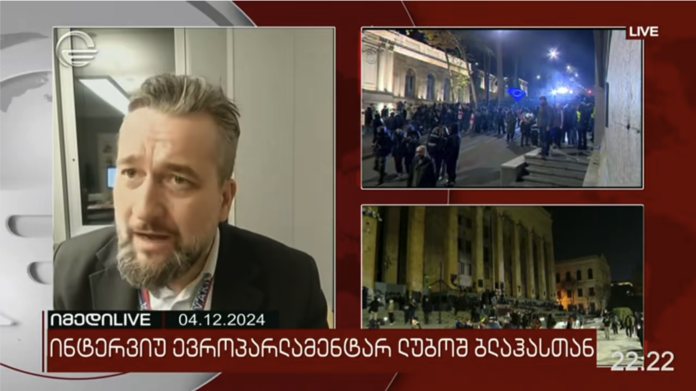In a provocative interview with a Georgian pro-Russian TV channel, Ľuboš Blaha, Slovak MEP and vice-chair of Robert Fico’s SMER party, accused the European Union of undermining Georgian sovereignty, manipulating elections, and promoting Russophobia. He condemned the EU’s alleged interference in Georgia’s democratic processes, drawing parallels to Ukraine’s Maidan protests and framing such actions as destabilising and dangerous. Blaha lambasted Western advocacy for LGBTQ+ rights as “neoliberal extremism,” praised Georgia’s traditional family laws, and claimed foreign-funded NGOs erode national sovereignty. Denouncing the EU as a “neo-empire” exploiting smaller nations, he urged Georgia to prioritise pragmatic dialogue with Russia over Western pressure to adopt anti-Russian policies. The Slovak MEP also criticised EU election observers for bias, called NATO and EU institutions hypocritical, and warned against escalating conflicts, portraying the West as fuelling war for geopolitical gains. Blaha’s remarks encapsulate a staunchly pro-Russian, anti-liberal democratic rhetoric aligned with his party’s nationalist and sovereigntist agenda.
European Parliament’s Role in Georgian Elections
Blaha accused the European Parliament of undermining Georgian democracy by siding with opposition parties and challenging the legitimacy of recent elections.
“The European Parliament criticizes Georgia, claiming issues with its election processes, but the Georgian people won the elections. It was democratic and transparent. Yet, they delegitimise the results by supporting the opposition. This is not democracy.”
He further claimed that EU actions diminish respect for Georgian sovereignty:
“Two weeks ago, the European Parliament adopted a resolution criticising Georgian politics. How can they be impartial when they come to judge elections with a preconceived bias?”
Comparison to Ukraine’s Maidan Protests
Blaha drew parallels between events in Georgia and the 2014 Ukrainian Maidan protests, warning of similar destabilisation.
“This looks like a terrible revolution, akin to Maidan in Ukraine. It is very dangerous for Georgia to go down this path, as it only causes suffering for its people. Democracy cannot thrive when external forces impose such upheaval.”
He attributed such risks to what he views as Western interference.
Russophobia and European Policies
Blaha lambasted the EU’s approach to Russia, accusing it of unjustly pressuring Georgia to adopt an anti-Russian stance.
“The EU uses Russophobia as a weapon against Georgia simply because Georgia refuses to go to war with Russia. This is an unacceptable and aggressive stance by the West, aimed at punishing any nation that chooses peace over conflict.”
LGBTQ+ Rights and Family Protection Laws
Blaha praised Georgian efforts to uphold traditional family values, positioning them against Western liberal policies.
“The European Parliament criticised Georgia for its laws protecting families. These laws are natural and legitimate. It is absurd that the EU pushes LGBTQ+ ideology on nations that want to preserve their cultural and moral foundations.”
He referred to such advocacy as a form of “neoliberal extremism.”
Role of NGOs and Foreign Influence
The Slovak MEP took aim at NGOs operating in Georgia, which he alleged are tools of foreign influence undermining sovereignty.
“NGOs, often funded by Soros and other foreign actors, meddle in Georgian politics. They pretend to stand for democracy but are actually eroding it by serving external agendas. Georgia must resist this.”
EU as a “Neo-Empire”
Blaha characterised the EU as an imperialistic entity exploiting smaller nations.
“The EU behaves like a neo-empire, dictating policies to countries like Georgia and Slovakia. They claim to promote democracy, but in truth, they suppress national sovereignty.”
Call for Pragmatic Relations with Russia
Blaha framed dialogue with Russia as essential for stability and dismissed criticisms of pro-Russian stances.
“Talking to Russia is not a betrayal. It is a pragmatic decision to ensure peace. Those who vilify this as pro-Russian are promoting dangerous Russophobia. Georgia should prioritise its interests over pleasing Western powers.”
Geopolitical Tensions and War
Blaha condemned Western policies for escalating conflicts in the region and expressed his anti-war stance.
“Western powers are willing to escalate tensions with Russia, dragging countries like Georgia into their geopolitical games. This is not in the interest of the Georgian people. War would bring nothing but destruction.”
He urged Georgia to resist being drawn into confrontations.
“The pressure from Europe to adopt anti-Russian stances is unjust and counterproductive. Georgians must choose peace.”
Criticism of European Parliament’s Impartiality
Blaha questioned the credibility of EU election observers in Georgia.
“If the European Parliament sends a mission with a biased agenda, how can we trust their conclusions? They clearly support the opposition and undermine the democratic process.”
General Distrust of Western Institutions
In a broader critique of Western influence, Blaha accused EU and NATO institutions of hypocrisy and exploitation.
“The West employs double standards, using smaller nations as pawns in their strategic games. They talk about democracy but ignore the will of the people when it doesn’t align with their interests.”
The complete transcript of the interview is attached in full as a downloadable file for reference. Credit: Martin Hodás







